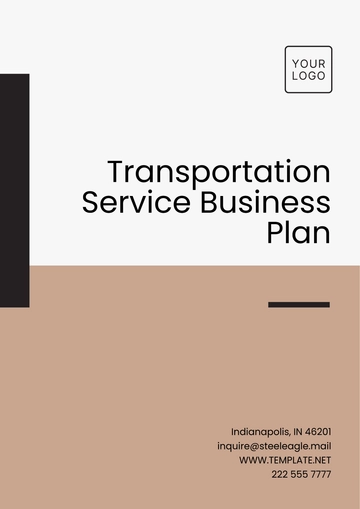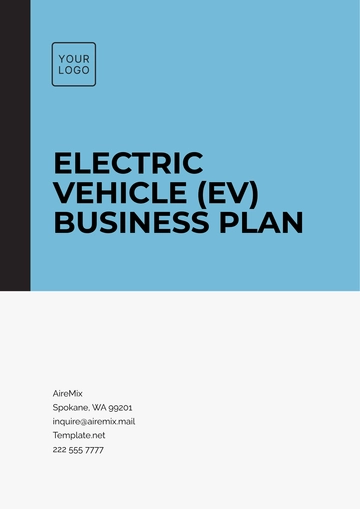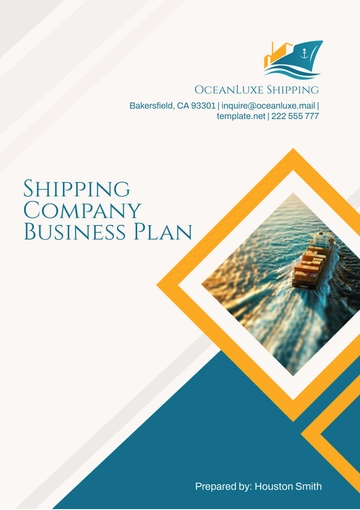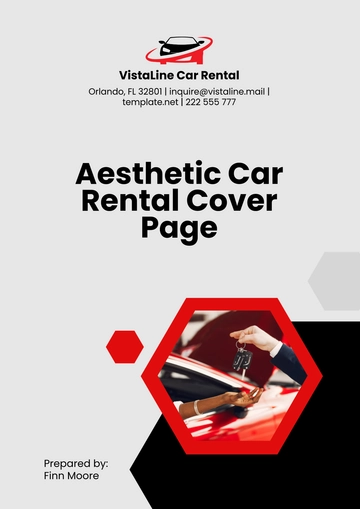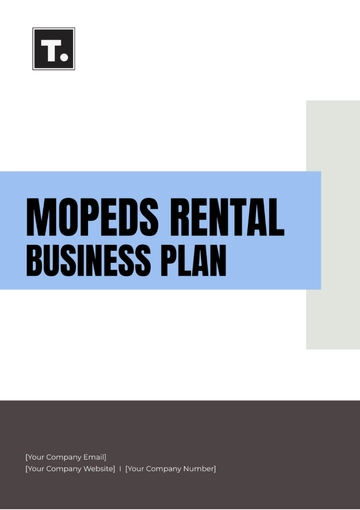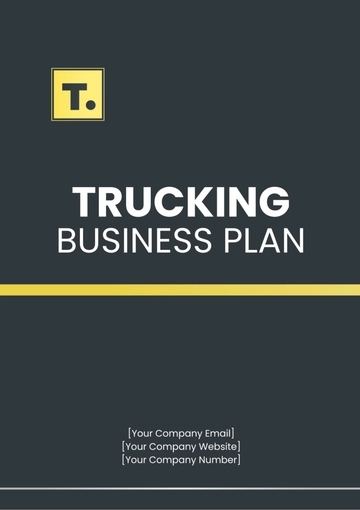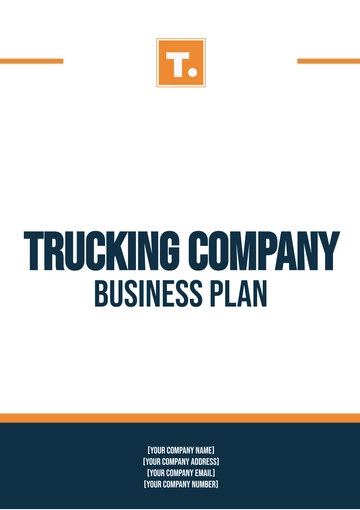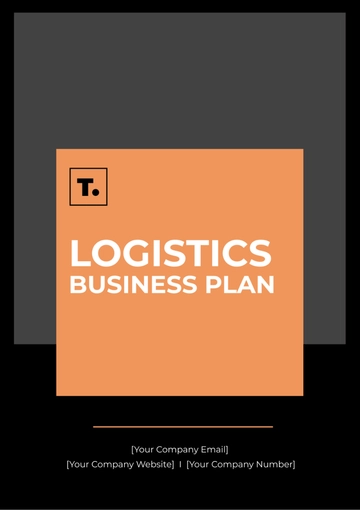Free Transportation Service Business Plan
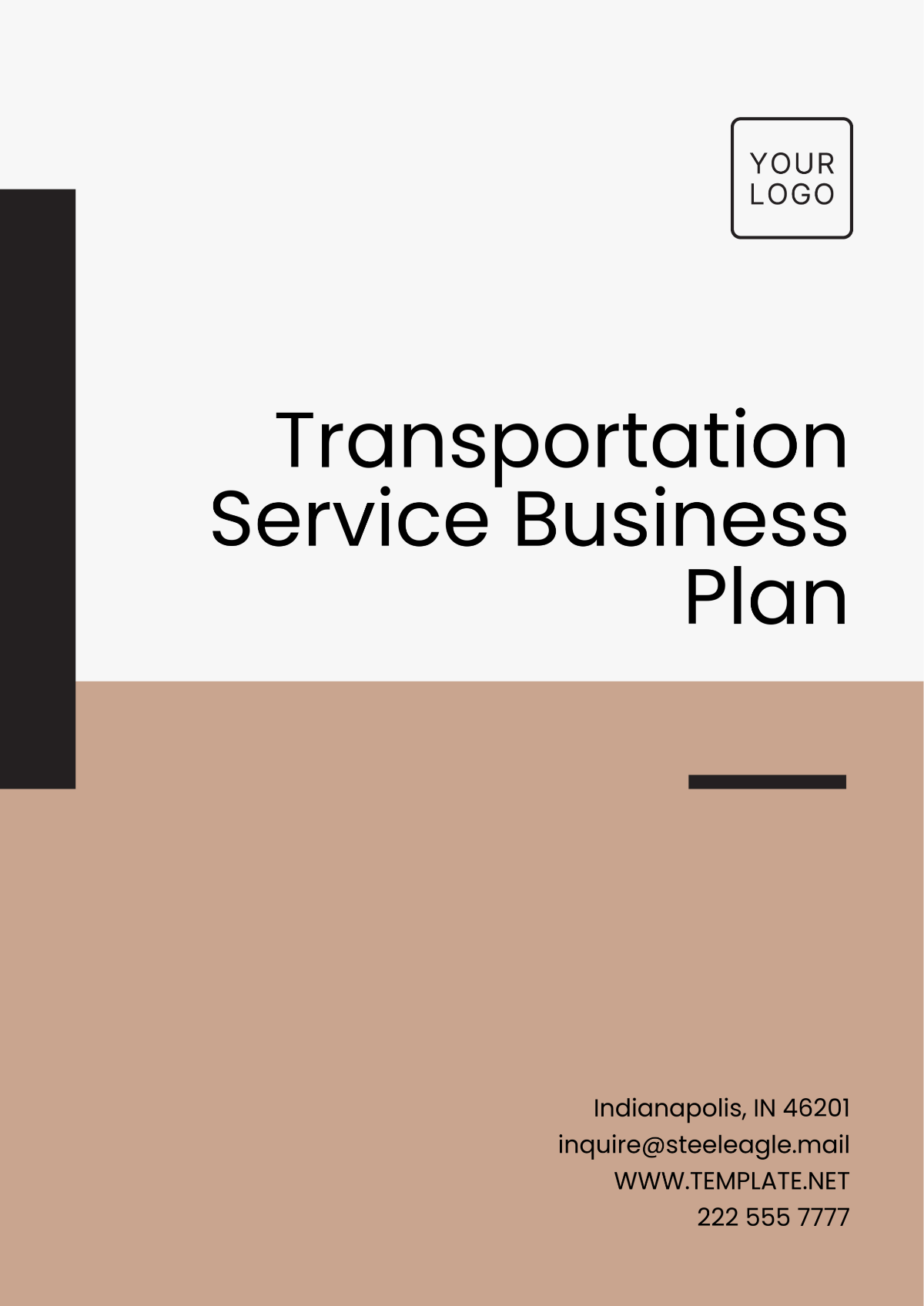
Prepared by: [Your Name]
Company: [Your Company Name]
Date: [Date]
1. Executive Summary
[Your Company Name] aims to provide reliable, efficient, and cost-effective transportation services tailored to meet the needs of individuals, businesses, and e-commerce companies. Our mission is to offer safe, timely, and high-quality transportation options through innovation and exceptional customer service. This business plan outlines our strategic vision, service offerings, market analysis, financial projections, and operational approach to establish a strong foothold in the transportation sector.
2. Company Description
[Your Company Name] is a new transportation service provider based in a metropolitan region. We aim to fill the gap in the market for high-quality, dependable, and affordable transportation services. Whether serving individuals with daily commutes or corporate clients needing transportation for employees and guests, [Your Company Name] is dedicated to making travel more efficient and accessible for all.
A. Vision Statement
To be the leading provider of transportation solutions, known for exceptional customer service, reliability, and sustainable growth.
B. Mission Statement
To deliver safe, efficient, and timely transportation services that cater to the diverse needs of our customers while fostering long-term sustainability and innovation in the industry.
C. Core Values
Reliability: Ensuring that our services are consistently on time and dependable.
Customer-Centricity: Always putting our customers first and tailoring our services to their specific needs.
Sustainability: Embracing eco-friendly practices and maintaining a minimal environmental impact.
Innovation: Continuously improving our service offerings through technology and creative solutions.
Integrity: Operating transparently, ethically, and responsibly in all our business dealings.
3. Market Analysis
A. Industry Overview
The global transportation industry continues to experience significant growth driven by urbanization, technological advancements, and the rise in e-commerce. [Your Company Name] is entering this dynamic market with a strong strategy focused on providing personalized services and superior customer experiences.
B. Target Market
Individuals: People seeking reliable and comfortable transportation options for daily commutes, leisure, and special events.
Corporate Clients: Businesses need dependable, professional transportation services for employees, clients, and special events.
E-commerce & Logistics: Companies require efficient delivery and logistics services to support their supply chain and last-mile delivery needs.
C. Competitive Analysis
[Your Company Name] will differentiate itself from competitors by providing a superior experience in the following ways:
Personalized Service: A more tailored, customer-focused experience compared to standard ride-sharing and public transport options.
Subscription Models: Offering subscription packages for regular commuters and corporate clients to ensure affordability and convenience.
Technology Integration: Utilizing a user-friendly app for easy bookings, real-time tracking, and a seamless customer experience.
Fleet Maintenance: Ensuring our fleet is well-maintained, eco-friendly, and equipped with modern amenities.
Key competitors include:
Public Transport Systems
Ride-Sharing Services (e.g., Uber, Lyft)
Local Taxi Services
4. Organization and Management
[Your Company Name] will be managed by a team of experienced professionals with diverse backgrounds in transportation, logistics, and business management. The company’s leadership structure will promote efficient decision-making and effective execution of operational strategies.
Organizational Structure
CEO – Responsible for strategic vision, overall business direction, and growth.
Operations Manager – Oversees day-to-day operations, fleet management, and logistics.
Marketing Manager – Leads the branding, advertising, and promotional campaigns.
Finance Manager – Manages financial planning, reporting, and cash flow.
Fleet Manager – Responsible for vehicle maintenance, scheduling, and fleet optimization.
5. Services Offered
[Your Company Name] will offer a wide range of transportation services to cater to various customer needs:
Personal Transport Services: Reliable rides for individuals, including daily commuting, airport transfers, and leisure travel.
Corporate Transport Solutions: Tailored services for businesses requiring employee transportation, client shuttles, and event transport.
Event Transportation: Large group transportation for corporate events, conferences, weddings, and parties.
Logistics and Delivery Services: Efficient and timely logistics solutions for e-commerce companies, including package delivery and fleet management.
6. Marketing Strategy
[Your Company Name] will employ a comprehensive marketing strategy to build brand recognition, attract new customers, and foster loyalty.
Advertising and Promotion
Digital Marketing: Use of social media platforms, paid ads, and SEO strategies to reach target customers.
Partnerships: Collaborating with local businesses, event organizers, and e-commerce companies for cross-promotions.
Loyalty Programs: Offering discounts, membership plans, and referral bonuses to retain customers.
Community Engagement: Sponsorships of local events and involvement in community initiatives to build brand presence.
7. Financial Projections
The financial plan outlines the expected revenue, expenses, and profits for the first three years. It includes detailed projections for income, cash flow, and the break-even point.
Projected Income Statement
Year | Revenue | Expenses | Profit |
|---|---|---|---|
Year 1 | $500,000 | $350,000 | $150,000 |
Year 2 | $750,000 | $450,000 | $300,000 |
Year 3 | $1,000,000 | $600,000 | $400,000 |
Break-Even Analysis
[Your Company Name] expects to reach its break-even point within the second year of operation. The company will focus on reducing operational costs, improving customer acquisition, and increasing fleet utilization to maximize profitability.
8. Operational Plan
This section outlines the day-to-day operations of [Your Company Name].
Fleet Management: Regular maintenance, scheduling, and upgrades to ensure optimal fleet performance.
Technology Implementation: Development and deployment of a mobile app for booking, tracking, and payment, along with backend systems to manage operations efficiently.
Customer Service: A dedicated support team available 24/7 to address customer inquiries and concerns.
9. Risk Analysis
[Your Company Name] recognizes potential risks, including:
Market Competition: Constant innovation by competitors and evolving customer preferences.
Economic Fluctuations: Economic downturns could affect consumer spending on discretionary services.
Regulatory Changes: Changes in transportation laws or environmental regulations could impact business operations.
To mitigate these risks, the company will continuously monitor market trends, adjust its service offerings, and invest in technology and compliance to stay ahead of regulatory changes.
10. Conclusion
[Your Company Name] is poised for success with a strong business model, a focus on customer satisfaction, and a commitment to sustainable growth. Through strategic marketing, operational efficiency, and a customer-first approach, the company aims to become a trusted name in the transportation industry.
- 100% Customizable, free editor
- Access 1 Million+ Templates, photo’s & graphics
- Download or share as a template
- Click and replace photos, graphics, text, backgrounds
- Resize, crop, AI write & more
- Access advanced editor
The Transportation Service Business Plan Template from Template.net is an editable and customizable solution designed for entrepreneurs. Easily tailor the content to fit your needs with our Ai Editor Tool, allowing for effortless adjustments. This template provides a professional, structured framework to kickstart your transportation business, making planning and execution straightforward.
You may also like
- One Page Business Plan
- Coffee Shop Business Plan
- Restaurant Business Plan
- Food Business Plan
- Real Estate Business Plan
- Executive Summary Business Plan
- Cover Page Business Plan
- Nonprofit Business Plan
- Daycare Business Plan
- Construction Business Plan
- Startup Business Plan
- Medical Business Plan
- Bakery Business Plan
- Service Plan
- Hotel Business Plan
- Catering Business Plan
- School Business Plan
- Healthcare Business Plan
- Transportation Plan
- Sports Plan
- Car Wash Business Plan
- Salon Business Plan
- Clothing Business Plan
- Farming Business Plan
- Boutique Plan
